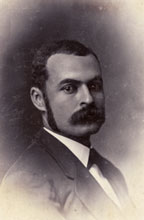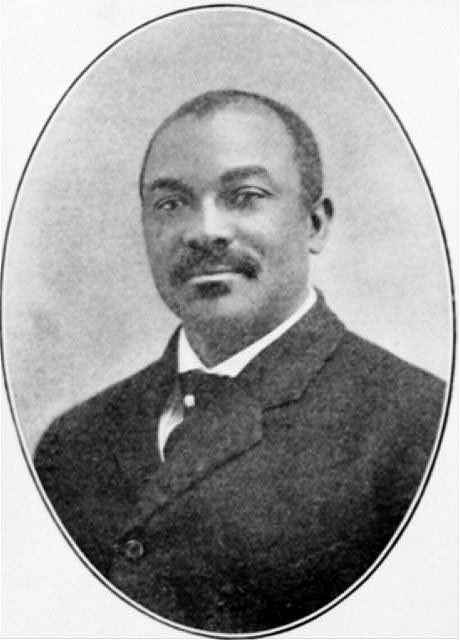 |
William McBirney Sloan
The State April 8. 1928 |
 |
William McBirney Sloan in ca. 1894
The State, April 8, 1928 |
 |
William McBirney Sloan
Courtesy of Anna via FindAGrave. |
William McBirney Sloan (b. August 25, 1854; d. December 10, 1931)
South Carolina. White.
Occupation: clerk, lawyer, revenue driver, railroad agent.
Father's occupation: clerk of the House of Representatives, grocer, merchant.
W. McBirney Sloan was born in Pendleton, SC in 1851 to John Trimmier Sloan and Eliza Ann Benson Sloan. His older brother Robert Sloan was also a student at USC and a member of the Clariosophic Society.
The year McBirney was born, his father John was elected to the position of clerk of the House of Representatives. He served as clerk over 25 years. He served consecutive terms until 1869, when the Republicans took control of the state government, and returned to the position in 1877, when Conservatives regained control.
Before becoming clerk, the father John had worked as a merchant. By 1860, he had accumulated considerable wealth and owned 61 enslaved workers. John is described in more detail in the entry for McBirney's brother Robert.
The Sloan family moved to Columbia in April, 1865, two months after the city had been devastated by federal troops led by General Sherman. In Columbia, McBirney attended the Columbia Male Academy. At the academy, Arthur studied alongside a number of other future USC students including Holmes Agnew, Charles W. Parmele, Charles J. and Edward M. Babbitt (sons of USC Professor Babbitt), Arthur D. Rivers, Edwin W. Screven, and John P. Thomas Jr.
In Fall, 1872, McBirney matriculated at the University of South Carolina. That Spring, he was admitted into the Clariosophic Society. At the start of McBirney's second year at USC, the first African American student matriculated in the university. McBirney was left school in protest.
After leaving the University of South Carolina, McBirney began reading law at night. He was admitted to the bar, although he never started a legal practice.
McBirney played a small but significant role in the election of 1876. That year the outcome of the election was contested. According to ballet counted the Conservative candidates for state legislature in the counties of Edgefield and Laurens won the election. However, the number of votes cast in those counties exceeded the number of registered voters, so the Board of State Canvassers did not certify the election outcome. The Board was dominated by Republicans, and Conservatives alleged that the Board's action were improper and politically motivated. The outcomes of the elections in Edgefield and Laurens had national significance. They had the potential to determine both the gubernatorial and the presidential election.
The newly elected state legislature was required by state constitution to meet on November 28. However, on that day, the election dispute still had not been resolved. To guard against political violence, President Grant stationed federal troops at the Statehouse. When the legislature was to convene, federal troops limited access to the Hall of the House. When the Conservative candidates from Laurens and Edgefield tried to gain entrance, they were refused. In protest, the Conservative members-elect left the Statehouse and convened elsewhere (in Carolina Hall). Members were then sworn, and elected positions like Speaker of the House were filled. McBirney's father John was elected clerk and McBirney assistant clerk.
Two days later, on November 30, the Conservative members-elect tried again to gain entrance to the Statehouse. This time the members-elect from Laurens and Edgefield were granted entrance. However, Conservatives and the Republicans had each elected a Speaker of House. Each Speaker declared the other illegitimate, and confusion broke out as Democrats and Republicans tried to address the two speakers simultaneously.
Concerned that violence would break out, McBirney gave his father two pistols which he had been carrying. He then left the Statehouse and spent the half a day searching for more firearms. However, although tensions remained high, no violence broke out and the legislatures remained in the hall day and night for the next four days.
On December 3, a rumor spread that the Republicans were plotting to bring in a group of African-Americans from Charleston and have them forcibly remove the members-elect from Edgefield and Laurens. In response, thousands of armed Whites from all of the state came to Statehouse to support the Conservatives.
As armed Whites assembled outside the Statehouse, violence again threated to break out in the Hall of the House. Later McBirney recounted that one of the most dramatic moments was when a visitor came to the hall shortly before the Republican Speaker of the House arrived. Although an old friend of the Speaker, the visitor was strongly opposed to the actions of the Republicans. the Speaker entered the Hall, the visitor approached the speaker's stand and told him, "If anything happens, I'll kill you."
Despite the large presence of armed men at the statehouse, no violence broke out. Republicans and Conservatives continued to challenge each other over the election outcome, but they did so through the press and the legal system. On December 14, the Conservatives declared their candidate, Wade Hampton, the elected governor. However, the Republican governor did not recognize their decision. Hampton tried to demonstrate that he was governor in February, 1877 by issuing a pardon to a convict.
At the time that Hampton issued his pardon, most of the guards at the state penitentiary were African-American. Conservatives were concerned that the guard who respond to Hampton's pardon by releasing all the prisoners in protest. As a precaution, the local Conservative paramilitary group the Governor's Guards was asked to furnish a squad of men to act as prison guards. McBirney was among the members chosen to serve as guards. They were sworn in and remained at the prison for ten days, until the court ruled in favor of Hampton's pardon.
The dispute over the election outcome finally came to an end in April, 1876 (four months after Hampton claimed to have been elected). That month President Grant order that the federal troops guarding the Statehouse be withdrawn. Recognizing that Conservatives were likely to tried to seize political power through violent force and Republicans would unable to offer effective resistance, the Republican gubernatorial candidate announced that he would no longer dispute the election outcome.
A few years after the election, in 1879, McBirney entered city politics. That year he was asked to run as city alderman for Ward 1. He declined to run but was voted into office anyway. He ultimately served 4 terms as city alderman.
Around this time, McBirney went into business. He helped run the general merchandise firm of Sloan and Blakely. McBirney spent most of the 1880s working as a merchant, but in 1893, he began working for the government. That year the Democratic presidential candidate Grover Cleveland was elected. Cleveland was the first Democrat elected since the Civil War. South Carolina Conservatives benefitted from his election by receiving federal appointments. One of Cleveland's first appointments was the appointment of Confederate veteran D. Frank Bradley as South Carolina's internal revenue collector. McBirney became Bradley's chief deputy.
McBirney served as chief deputy collector of the internal revenue for a few years. He then returned to the position of assistant clerk of the House. After some years as assistant clerk, he returned to business, selling coal and business.
McBirney had returned to working for the federal government by 1890. By that time, he had been made a railway agent and was working at the Columbia office of the Seaboard Air Line.
During this period, McBirney became increasingly involved in city politics. He ran for city mayor in 1892. He lost the election, but was then elected to fill the unexpired term of an alderman who had died. Two years later, in 1894, he ran again for mayor, and this time he won the election. He was reelected and ultimately served from 1894 to 1898. During McBirney's time as mayor, the city of Columbia began to modernize. His administration was responsible for installing street lights than used electricity rather than gas and for replacing horse cars with electric trolley cars. He also worked to bring manufacturing, especially cotton mills, to Columbia. He pushed to lower taxes on mills and decrease transportation costs to encourage businesses to move their mills to the area.
Later on life McBirney worked in the United States internal revenue department, serving for 18 years . He was also a special United States gauger for the state alcohol dispensaries.
In December, 1931, McBirney suffered from pleurisy which developed into double pneumonia. He died of the illness on December 10, while hospitalized. He is buried in
Elmwood Cemetery.
Sources Cited
1) "'Wallace House' Officer Recalls Stirring Days." The State. April 8, 1928. p. 5.
2) "Sloan Rites Are Arranged." Columbia Record. December 9, 1931. p. 12.
2) 1860; Census Place: Pendleton, Anderson, South Carolina; Page: 256; Family History Library Film: 805212
3) 1870; Census Place: Columbia, Richland, South Carolina; Roll: M593_1507; Page: 91A; Family History Library Film: 553006
4) 1880; Census Place: Columbia, Richland, South Carolina; Roll: 1238; Page: 242A; Enumeration District: 162
5) 1900; Census Place: Columbia Ward 1, Richland, South Carolina; Page: 15; Enumeration District: 0084; FHL microfilm: 1241539
6) 1910; Census Place: Columbia Ward 1, Richland, South Carolina; Roll: T624_1471; Page: 13A; Enumeration District: 0079; FHL microfilm: 1375484
7) 1920; Census Place: Columbia Ward 1, Richland, South Carolina; Roll: T625_1707; Page: 28B; Enumeration District: 80
8) "Death of Col. John T. Sloan, Sr." The Anderson intelligencer, August 28, 1895, p. 3.
















